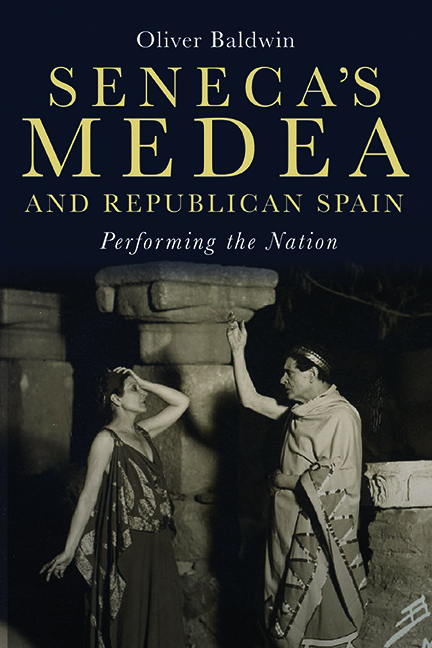Book contents
- Frontmatter
- Dedication
- Contents
- List of illustrations
- Acknowledgements
- List of abbreviations
- Introduction: A Spanish Medea in Republican Spain
- I Seneca’s Medea in Mérida: A reconstruction
- II Seneca and Hispania
- III Republica nunc sum: Building a Republic
- IV Medea and the social revolution
- V Hispano-Roman tragedy on a reformed stage
- Conclusion: The Republican Medea that was in Mérida
- Bibliography
- Index
Introduction: A Spanish Medea in Republican Spain
Published online by Cambridge University Press: 07 October 2022
- Frontmatter
- Dedication
- Contents
- List of illustrations
- Acknowledgements
- List of abbreviations
- Introduction: A Spanish Medea in Republican Spain
- I Seneca’s Medea in Mérida: A reconstruction
- II Seneca and Hispania
- III Republica nunc sum: Building a Republic
- IV Medea and the social revolution
- V Hispano-Roman tragedy on a reformed stage
- Conclusion: The Republican Medea that was in Mérida
- Bibliography
- Index
Summary
Seneca's Medea and the Second Spanish Republic
On 18 June 1933 Seneca's tragedy Medea was performed before more than three thousand spectators in the ruins of the Roman Theatre in Mérida, Western Spain. This production of Seneca's Medea, translated by the philosopher Miguel de Unamuno, produced by Spain's leading theatre company, the Xirgu-Borràs Company, and backed by the government of the Second Spanish Republic, became one of the most important theatre performances in Spanish history.
The town of Mérida, once the Roman Emerita Augusta, received hundreds of visitors to witness the great spectacle that was Seneca's Medea. Locals and nearby townsmen and townswomen were joined by national intellectuals, republican Members of Parliament, the ambassadors of Italy, Portugal and Uruguay and three representatives of the government of the Second Spanish Republic: the Prime Minister, Manuel Azaña, the Ministro de Instrucción Pública (Minister of Education and Culture) at the time, Francisco Barnés, and the Ministro de Estado (Foreign Minister), Fernando de los Ríos. The whole event became not only a memorable performance but also a republican celebration in its own right, with the governmental committee being cheered as they arrived at the Roman Theatre, while the republican national anthem, the ‘Himno de Riego’, was being played.
The Xirgu-Borràs Company produced and performed Seneca's Medea in Mérida. In it, its leading actress, Margarita Xirgu, played a red-clothed Medea, who enacted her pain, witchery and revenge before those assembled, finally killing the children of Jason, performed by a convincingly overwhelmed and scared Enric Borràs. The Orquesta Filarmónica de Madrid, led by the maestro Bartolomé Pérez Casas, provided a suitable musical pathos with Gluckian illustrations (see pp. 42, 243–47). The performance ended in a climax of theatrical spectacle in which an escaping Medea, on her dragon-led chariot, chased by a maddened torch-holding crowd, disappeared behind the columns of the scaenae frons while the orchestra played the prelude to Gluck's Alceste. The audience roared with emotional cheering and applause as the tragic curtain fell. The performance was a success and received much praise from all present. After all, a tragedy of the potency of Medea, authored by Lucius Annaeus Seneca, the philosopher from Córdoba, translated by a leading intellectual, Miguel de Unamuno, funded by the Republic and performed by the renowned Xirgu-Borràs Company had been staged at the ruins of the Roman Theatre of Emerita Augusta, a renewed theatrical stage after centuries of silence.
- Type
- Chapter
- Information
- Seneca's Medea and Republican SpainPerforming the Nation, pp. 1 - 30Publisher: Boydell & BrewerPrint publication year: 2022



